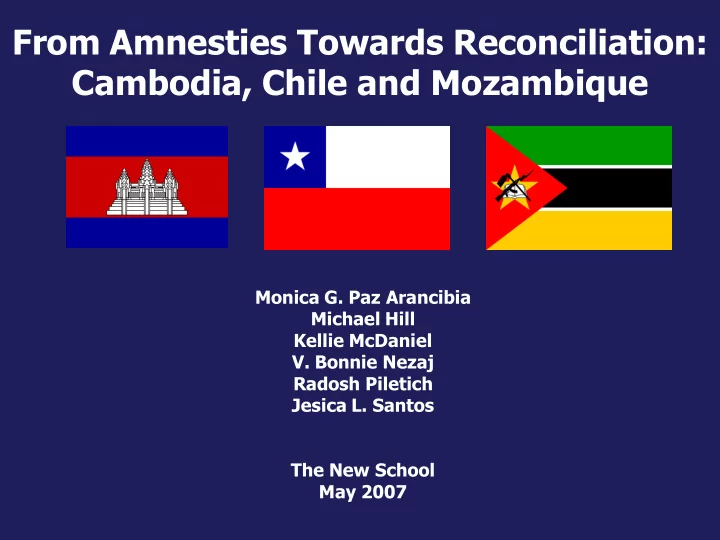

From Amnesties Towards Reconciliation: Cambodia, Chile and Mozambique Monica G. Paz Arancibia Michael Hill Kellie McDaniel V. Bonnie Nezaj Radosh Piletich Jesica L. Santos The New School May 2007
The Project Problem: Countries emerging from conflict and dealing with issues of justice often struggle between pursuing prosecutions, for war crimes and crimes against humanity, and granting amnesties Human Rights Watch’s position is that amnesty generally does not work and hinders longer-term peace prospects Purpose: To conduct an in-depth analysis of three cases, in which amnesty was granted and determine whether the lack of accountability can lead to long-term peace
Cambodia Population : 14 million 1970: Lon Nol Coup 1970-73 : US Bombing Campaign 1975: Khmer Rouge takes power 1978: Vietnam invades, removes Khmer Rouge 1991: UN-brokered Peace Process 2007-2008 : National/International War Crimes Tribunal
Genocide, Crimes Against Humanity and Gross Violations of Human Rights Approximately 1,000,000 killed (1 in 8) Total loss in population around 2,000,000 (over 25%) 10,000 ethnic Vietnamese 50,000 Buddhist monks (out of 80,000) 90,000 - 150,000 Chams (out of 250,000) Executions: 75,000 - 150,000 Massive population transfers, tortures, starvation, overwork, untreated and mistreated medical conditions
Amnesties in Cambodia 1. De Facto Amnesty, 1979 - for demobilization of Khmer Rouge soldiers - not an official amnesty 2. 1st Official Amnesty, 1994 - declared Khmer Rouge illegal - granted grace period for defections - denied amnesty to “leaders” 3. 2nd Amnesty/Royal Pardon, 1996 : “A pardon to Mr. Ieng Sary, for the sentence of death imposed by order of the 1979 People's Revolutionary Tribunal of Phnom Penh; and an amnesty for Mass Defection as a result of the prosecution under the Law to 1994 Amnesty Outlaw the Democratic Kampuchea Group.”
Ieng Sary - “Do I have remorse? No.” Pol Pot, Ieng Sary, and Son Sen (from left to right) Deputy Prime Minister, Minister of Foreign Affairs, Brother No. 3 Granted an amnesty for crimes against humanity and genocide Never apologized or displayed any remorse KRT judges have the power to overturn his amnesty
Chile Population: 16.3 million September 11, 1973 - Military Coup overthrew Salvador Allende Augusto Pinochet and the Junta - led a 17- year dictatorship National Congress and Constitutional Tribunal were closed Supreme Court declared support Military courts replaced civilian courts
Conflict Overview All leftist political parties hunted down and declared illegal “Caravan of Death” - executed nearly 80 people between October 16 - 19 DINA- special intelligence unit Operation Condor Abuses: illegal detentions, murder, torture, disappearances and exile 3,000 killed approx. 200,000 exiled 1,000 disappeared The Junta more than 28,000 tortured
Institutionalized Impunity Amnesty Law 2191 of 1978 a self-pardon, covers 1973-1978 Judiciary and competing jurisdictions Constitution of 1980 “ I was tortured ”
Dealing with the Past Concertación (Coalition of Parties) Truth and Reconciliation Commission 1990; National Commission on Imprisonment and Torture 2004 Pinochet Precedent Trials Amnesty Law has yet to be annulled Constitution of 1980 Still in Effect Where are they?
Mozambique Population: 19.4 million Independence from Portugal in 1975, after 10-year war Civil War (1975-1992) between RENAMO and FRELIMO 1,000,000 deaths during the conflict (500,000 were children) 4,000,000 refugees 1.7 million IDPs 15,000 landmine victims
General Peace Agreement and Amnesty Overview 1992 Peace Agreement End of Conflict Demobilization of Troops RENAMO officially recognized as a political party 1992 General Amnesty for RENAMO insurgents and state armed forces Release of 300 prisoners Amnesty Contrasts sharply with International Law guidelines Multi-party democracy and elections (1994, 1999, 2004)
Healing and Reconciliation No Truth Commission was Established Limited Accountability Options Political and institutional constraints Culture of Peace and Healing Ceremonies Principle of forgiveness Current State of Human Rights Governance Issues Judiciary corruption Lack of training
Results Amnesties for ‘serious crimes in international law’ can - in some cases - lead to long-term peace and stability. Long-term peace without accountability does not lead to full reconciliation. Full reconciliation entails both conflict-resolution and peace-building during transition periods that are based on respect for human rights. To achieve reconciliation and rule of law, amnesties may have to be annulled at some point after transition, depending on the case.
Deliverables CAMBODIA I. Summary Of Conflicts II. Crimes and Amnesties III. Cambodia Today IV. Conclusion CHILE I. Conflict Overview II. Abuses and Impunity III. Transition to Democracy IV. Conclusion MOZAMBIQUE I. Summary of Conflict II. Atrocities, Peace Agreement, Amnesty III. Current Situation IV. Conclusion Appendices Digital copy of Audio-Recorded Interviews
Methodology Desk Analysis Overview of Conflict Crimes, Abuses and Amnesties Transition and Reconciliation Case Study Conclusions Process Individual and Team Research Weekly Group Meetings Periodic Consultations with Client Weekly Meetings with PIA Coordinator and Supervisor Editing Rounds One-on-One Expert Interviews
Lessons Learned: Amnesties Cambodia: Amnesties facilitated democracy and peace, but fostered impunity and corruption, and have proved an obstacle to reconciliation. Chile: Amnesty, though a variable in its peaceful transition, relative political stability and economic progress, is unacceptable because it is a self- pardon and does not address reconciliation. Mozambique: Amnesty allowed for a peaceful transition because of Mozambique’ traditional and cultural principle of forgiveness, but the question of governance and respect for human rights remains problematic. Amnesties: a space of contention between states rights and individual rights functionality should not be dismissed entirely by policymakers and peace brokers Human Rights must ultimately be the foundation for reconciliation
Lessons Learned: PIA Research Practice: Each page of writing requires 10-50 pages of research. Cite all sources immediately while writing. Group Work: More difficult than an individualized thesis, but more rewarding. Editing can be an opportunity to switch partners and gain a fresh perspective on research. Client Relations: Important for Client to read through and agree to Terms of Reference. The more information/guidance one can get from Client the better.
Future of the Project HRW is working on producing a report on the granting of amnesties in countries emerging from conflict Our research on three cases will inform their report
Recommend
More recommend